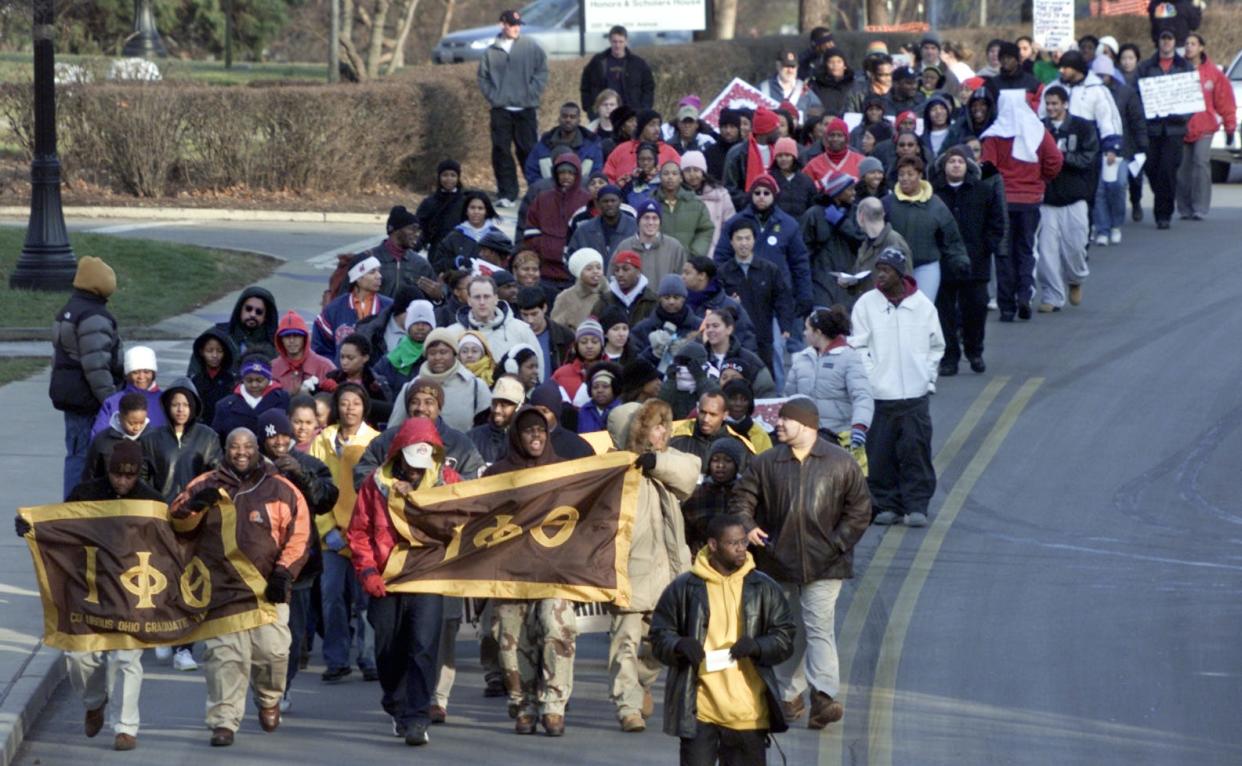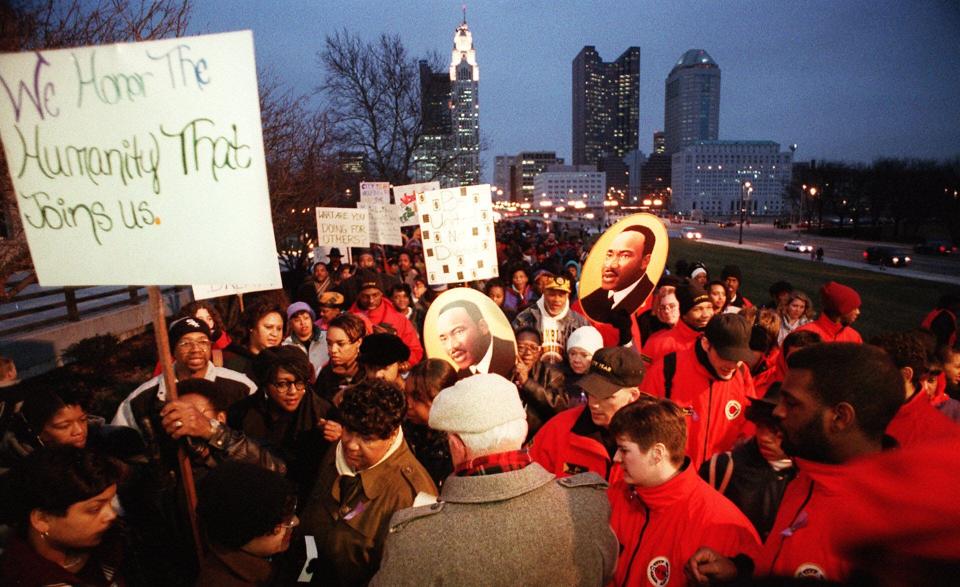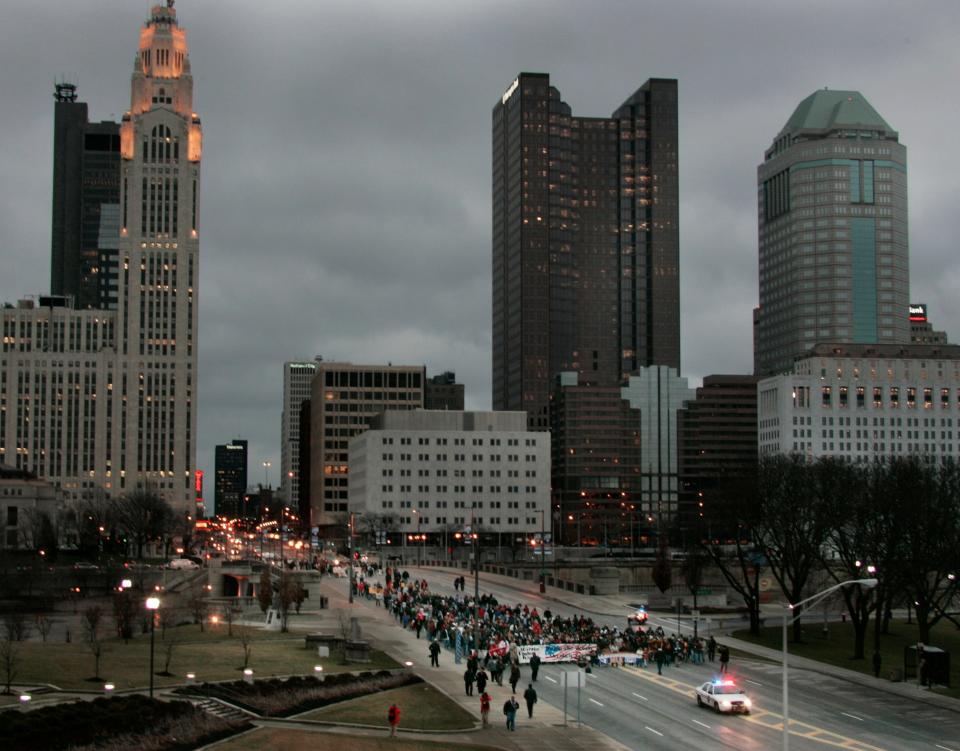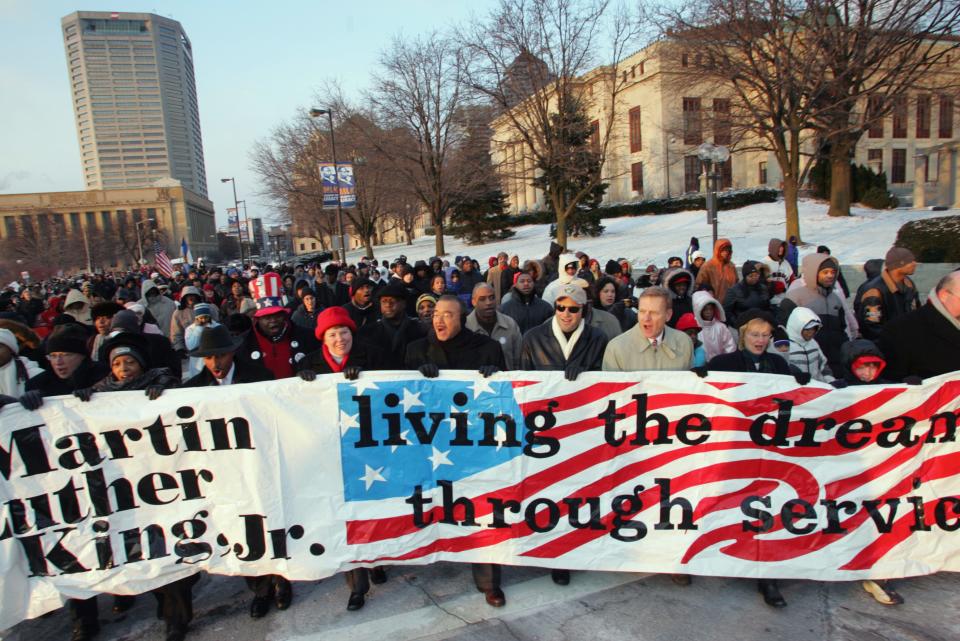Ohio overcame struggle to be an early adopter of the MLK Day holiday

- Oops!Something went wrong.Please try again later.
In September 1974, the Ohio Democratic Party was debating its statewide platform, touching on issues such as bringing down skyrocketing inflation and criticizing President Gerald Ford's pardon of former President Richard Nixon.
Tucked into the proposed platform was a demand for a new holiday recognizing slain civil rights leader Martin Luther King Jr., who had been gunned down in Memphis only six years earlier. Only Illinois had an MLK Day at the time, passed the year before, and three other states were in the process of creating their own state holidays for King.
Over the next several months, Ohio would push the measure through the Statehouse and into law — eight years before the federal government and a quarter century before all states had recognized the holiday.
"I remember the fight," said Ann B. Walker, now 100 years old, a pioneering Columbus Black journalist who worked in local newspapers, radio and television. "Most of them who were involved are gone."
Timeline: The life of Martin Luther King Jr.
The issue was divisive, Walker recalled.
"You didn't have the community coming together (over King) like they have recently," said Walker, who interviewed King for a half-hour for a local Columbus TV station because he demanded that a Black journalist be given the opportunity.
The idea for a statewide King holiday got a cool reception from many Ohio lawmakers, but passed the state Senate 24-5 in February 1975. Critics called King an "apostle of violence," contending community unrest followed throughout his marches in the South.

Columbus school board was concerned about cost
Even the Columbus City Schools Board of Education, which passed a resolution of support, wasn't wholly sold on a "mandatory holiday" to memorialize King. That would mean paying the entire district staff to take a day off, costing $100,000, or about $589,000 today.
Board member Virginia Prentice thought a better holiday would be for "famous" presidents. Member M. Steven Boley voted no on the resolution, calling it a "non-educational issue."
Some Columbus school board members argued that schools should be able to stay open on the holiday. While they debated the issue inside, they were being picketed outside by the "Student Coalition Against Racism," which was demanding the city's segregated school attendance zones be voluntarily integrated to avoid a looming federal lawsuit, according to April 9, 1975 edition of The Dispatch.
The district would go on to lose that lawsuit and was ordered by a federal judge to use busing for desegregation starting in the fall of 1979.
State officials were cool to the proposed holiday's cost, too. The state had 57,300 employees that would get a paid day off or overtime to work the day, which could cost an estimated $2.6 million, or about $15.3 million today.
The measure wasn't a sure thing to pass the Ohio House.
Lawmakers had other issues on their plate that April, like a proposal to lower the speed limit on state highways to 55 mph, and a bill to eliminate the ban on selling liquor on Election Day, imposed when "unscrupulous politicians 'bought votes' with drinks," The Dispatch reported.
One of the main objectors to the King holiday was Rep. Bill Batchelder, a longtime Republican lawmaker from Medina County who served from 1968 to 1999 and then again from 2007 until 2014, when he retired as speaker.
King advocated disobedience to the law, Batchelder charged, and the country should hold "law above all else."
Opponents pushed for the day to be an unofficial "day of memorium," and not a state holiday — and they almost succeeded, losing on a 46-44 vote in the House.
Rep. William Mallory, a Democrat from Cincinnati, played King's "I have a dream" speech for the House chamber, recorded in Washington, D.C., in 1963. He called King a "revolutionary who never fired a shot" and who "loved all men."
After an hourlong debate, the Ohio House voted 57-33 to create the holiday, and it was signed into law "without comment" by Gov. James A. Rhodes on May 2, 1975.
Despite the lack of any signing ceremony or even a statement from Rhodes, "we were so glad that he signed it," Walker said.
Holiday comes as Vietnam War ends
A lot of big things were changing: The signing came just two days after the fall of Saigon, ending the Vietnam War. The same day Rhodes signed the King holiday into law, Vietnam would appear in no fewer than eight stories in The Dispatch, including one about whether the world still had confidence in the "steadfastness" of "American power."
People were suddenly questioning government more than ever.
King's widow, Coretta, was calling for the investigation of her husband's murder to be reopened, saying "it appears there was a conspiracy." Documents released showed that the government was spying on MLK and "felt he was a threat to the system as it existed," she said.

The first King holiday in Ohio finally took place on Jan. 19, 1976, the third Monday of the month. But critics continued on the attack.
"I should think the minorities who apparently almost worship the man, would be a bit more sympathetic with the taxpayers of the nation," said a letter to the editor in The Dispatch. It noted taxpayers were "already spending billions each year for the poor and underprivileged who identify themselves" with King.
In May 1976, James Earl Ray, who confessed to shooting King and was serving a 99-year prison sentence in Tennessee, lost an appeal before a federal appellate court in Cincinnati to withdraw that plea and stand trial. He died in 1998.
When she interviewed King in Columbus, Walker said that he wanted to talk about equal opportunity in education, "about the issues that he felt was so important, for instance, like employment. He felt all across the country there were Blacks that weren't not fully employed, and they should be."
"Those were the issues that were tearing the South apart."

Walker said that's why the MLK holiday is still important, "because some of the goals that he had set for himself, for the organization ... have not been achieved."
"I think that there are still people across the community that recognizes it's imperative that we continue to observe" the holiday, she said.
"We're still fighting the same issues that Dr. Martin Luther King did when he was alive," agreed Nana Watson, president of the NAACP Columbus chapter, who said she considers Walker her mentor. "The same issues, just different times.
"The unleashing of the dogs in Circleville (a reference to a Black trucker attacked by a police dog last year), voter suppression, it's the same thing. So the issues that he fought for are the same today, just in a different way."
wbush@gannett.com
@ReporterBush
This article originally appeared on The Columbus Dispatch: Lengthy battle before Ohio became an early adopter of the MLK holiday

